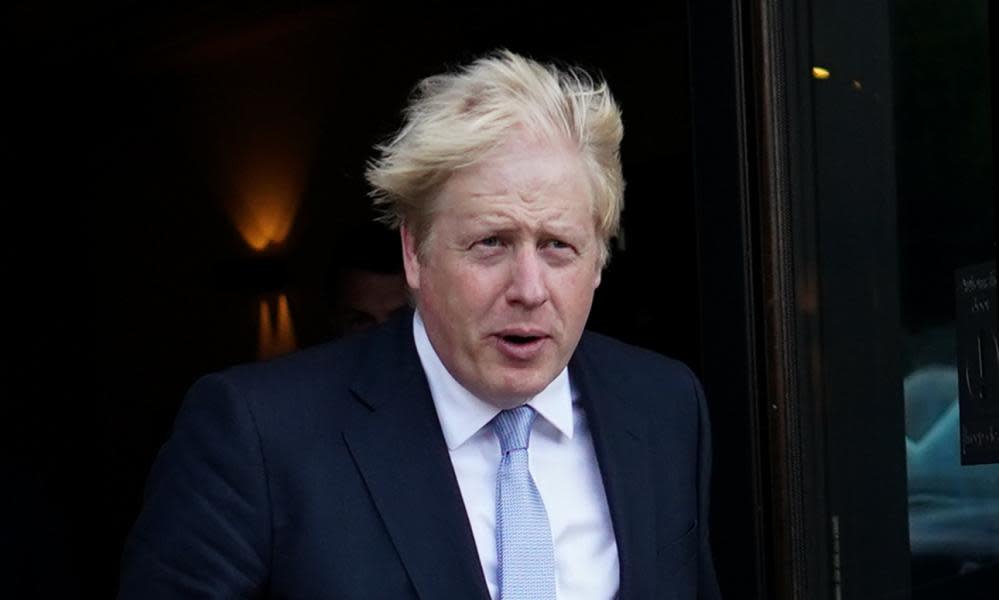Concerns grow that scale of ‘partygate’ is now too great for Sue Gray’s inquiry

As more and more lockdown gatherings are exposed, there are calls for the police to override the civil service investigation
When the country was in lockdown in late March 2020 and members of parliament had returned to their constituencies for an early Easter recess, the then business minister Nadhim Zahawi set out the rules for businesses around the country to fight the pandemic.
He urged them to help prevent the spread of disease by avoiding unnecessary mixing. “Workers should try to minimise all meetings and gatherings in the workplace,” he said in a written parliamentary answer.
Across the country, businesses, charities and public organisations heeded the message. It now appears there was one address that was a notable exception to these guidelines: No 10 Downing Street.
Related: How No 10’s alleged parties took place as UK Covid death toll rose – interactive
From the national lockdown announced by Boris Johnson on 23 March 2020 until April last year, there were at least 14 parties, leaving dos, quizzes and meetings-with-drinks at Downing Street, as well as other Whitehall offices.
Watch: Protest outside Downing Street after 'partygate' revelations
“It was ‘party on’ and nobody was saying ‘don’t do this’,” said Lord Kerslake, a former head of the civil service, last week. “Once it started, it just got worse and worse. There was a lack of moral awareness.
“It’s an appallingly undisciplined, irresponsible and tone-deaf behaviour which showed a complete lack of empathy for the way in which the country was having to suffer from lockdown at the time.”
It was alleged last week that one of the events last May spilled into the garden in the late hours and a reveller broke a child’s swing belonging to Wilf Johnson, the prime minister’s son. It is also claimed a suitcase was used on at least one occasion for a supermarket run to stock up on alcohol, and a £142 drinks fridge was installed in the ground-floor press office for “wine-time Fridays”.
The “partygate” scandal is vying to be the biggest political mess of Johnson’s career. Sue Gray, the second permanent secretary at the Department for Levelling Up, Housing and Communities, who was the head of propriety and ethics in the Cabinet Office for six years, has the unenviable task of unpicking it.
She has a reputation for being fair, independent and tough-minded, but there is a growing consensus that her inquiry is no longer fit for purpose.
Kerslake said: “When the inquiry started, it was about one event and we didn’t know that the prime minister was involved. Now we find that there were over a dozen events and not only is the prime minister implicated but he is front, back and centre of what happened.
“You cannot have a situation where a civil servant will make a pronouncement that could end the office of a prime minister. The consequence is that Sue Gray will inevitably have to stop short of that.”
Jonathan Powell, Tony Blair’s former chief of staff, who served in Downing Street for a decade, said Gray would set out the facts and the matter would be decided in the “court of public opinion”.

He said Downing Street was spinning the report as a “get out of jail” card because officials were confident there would be no finding of the prime minister breaching lockdown laws, since the matter was not in the inquiry’s remit.
Powell said he had high regard for Gray, but it was “totally inappropriate” for the inquiry to be conducted by a civil servant reporting to the prime minister. He said it would be “career-shortening” for her to deliver a judgment that the prime minister had potentially broken the law or breached the ministerial code and it would be better to have an independent non-judicial inquiry conducted in the space of a few weeks.
Powell also said Johnson’s staff appeared to have held more staff parties in a period of months than Blair’s team had held in a decade. “It’s pretty extraordinary,” he said. “I don’t know what time was left for work.”
He said his experience of Downing Street was that it had been extremely difficult to take in any food or drink without exhaustive checks by the police. He said: “I am amazed they could send someone out and come back with a suitcase full of booze. Imagine putting that through the scanner.”
Jolyon Maugham, director of the Good Law Project, a non-profit organisation that campaigns on legal issues, said the investigation into the parties should now be led by the police.
He said: “The key question is whether the prime minister, civil servants or special advisers have committed a criminal offence. This inquiry by Sue Gray is not asked to answer that question. The whole thing feels like a smokescreen for what should be happening – an investigation by the Metropolitan police.”
Under the terms of reference of Gray’s inquiry, if any evidence is found that potentially involves a criminal offence, it will be passed to the police. If that happened, the government investigation might be put on hold.
The Metropolitan police said on Saturday that it has “ongoing contact” with the Cabinet Office in relation to the inquiry, but would not comment on whether it had received any material involving potential offences.
Adam Wagner, a barrister and expert in Covid law, said Gray had a conflict of interest because she was investigating more senior figures in government.
“It is clearly compromised,” he said. “It wouldn’t pass muster as an independent investigation in any legal setting.”


